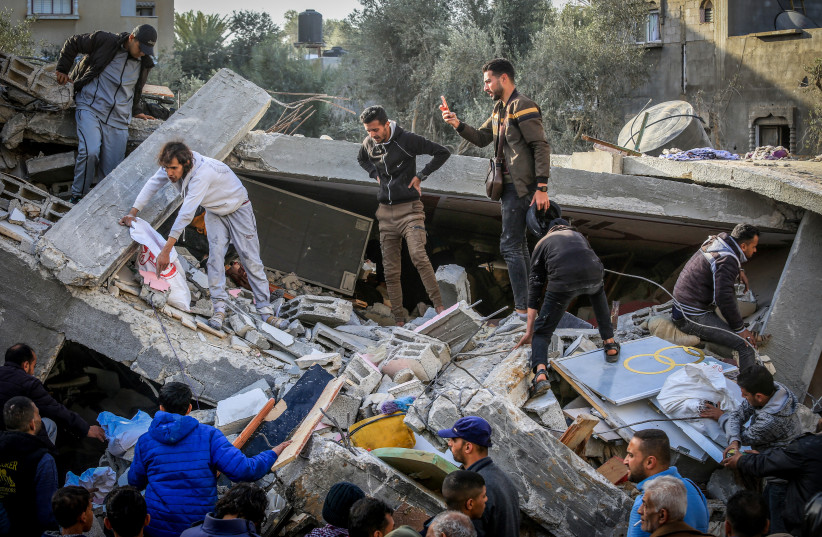The choice seemed simple: either a hostage deal would be reached before Ramadan, or the IDF would supercharge the Gaza invasion for a third time since October – by invading Rafah.
Now, everyone—from Prime Minister Benjamin Netanyahu to Defense Minister Yoav Gallant, to Netanyahu’s quasi-ally-quasi opposition Benny Gantz, to apolitical IDF Chief of Staff Lt.-Gen. Herzi Halevi – had said so.
Every one of them has also said that even if there were a hostage deal, a key component of it would be an eventual entry into Rafah to dismantle Hamas’s battalions there.
This did not seem to leave much room for interpretation.
Why a Rafah invasion is less likely than ever
And yet, here we are, entering Ramadan, with no signs whatsoever that the IDF is about to enter Rafah.
The opposite is true.
Nearly every day since the end of last week, it seemed that the US or a different foreign ally was intervening to provide humanitarian aid to Gaza.

If anything, these interventions make an immediate entry by the IDF less likely because of the ensuing complications. In addition, there are no signs of the military calling up the additional troops it would need for a drive into Rafah.
Is it possible that all of this is an elaborate fake-out by the IDF to surprise attack Hamas in Rafah? In theory, that is possible, but given the IDF’s commitment to evacuate Palestinian civilians before it attacks, such a ruse is not likely in the works.
What is most likely is that the IDF is putting off Rafah until after Ramadan.
If there had been a premise that both Israel and Hamas, along with the rest of the world, would prefer a quiet and respectful Ramadan, it became clear in recent days that Hamas leader Yahya Sinwar thought this process gave him an advantage.
At one point, it looked like Netanyahu might significantly limit which Arabs and Palestinians could visit the Temple Mount during Ramadan, something that could have played into Sinwar’s plan to incite the region into a larger religious conflict.
Sinwar still hopes that he can bring Iran, Hezbollah, the Houthis, and Iranian proxies in Syria and Iraq into a much more intense war with Israel – while inflaming the Arab-Israeli and West Bank Palestinian populations.
He is still holding out to emerge from this conflict with a “win,” a win that he has so far missed – after all of his “allies” showed restraint as his forces were crushed throughout Gaza.
Israel wants to avoid giving him this prize and has realized that taking Rafah in April or May is not so different from taking it in March.
Additionally, the intensity of the US’s opposition to attacking Rafah, along with escalating criticism from Western allies about the humanitarian crisis in Gaza, has held Israel back because Israel wants to dismantle Hamas while maintaining as much backing as possible from the US.
It is thus an Israeli hope that, if the IDF showed restraint when it came to Rafah for around two months after achieving operational control of Khan Yunis – including during Ramadan – to give Hamas time to agree to a deal, the US would be less averse to a Rafah attack scenario of no deal post-Ramadan.
It also seems that Sinwar, the IDF, and the US are coming to terms with the fact that pieces of the deal cannot work as negotiated.
If, as multiple sources have hinted to The Jerusalem Post, only around 70 hostages are alive out of the 134, Hamas may not be able to give up 45 civilian women and children at one per day, because there may not be that many alive.
The IDF and US also may be closer to accepting Hamas’s claim that it does not know who is alive and where they are located.
Sources have also indicated to The Post that the hostages may be more spread out now, following the fall of Khan Yunis, than at any time since October 7.
It still seems a large group is being held in Rafah and some in central Gaza, but there may be hostages in other places.
All of this could require more time to negotiate.
What are we supposed to make of promises the IDF made to not stop fighting Hamas during Ramadan – especially since, if they did, they would be giving Hamas everything it wants for no concessions? That promise will likely hold.
It will mean that during Ramadan, IDF operations will continue in northern and southern Gaza, as they have been, save for Rafah. It will be interesting to see whether those operations do slow down some – in particular at night when Muslims traditionally break their fast.
The challenge for Israel will be to keep up the pressure while preventing Sinwar from scoring any new region-wide achievements.
But this is what no one wants to say out loud – because it would mean admitting that, despite the IDF’s impressive tactical victories in the enclave, Sinwar still has significant leverage over the end game of this war.
Either before or post-Ramadan, Israel will need to address Rafah if it is to have any hope of ensuring that Hamas cannot return to rule Gaza.
